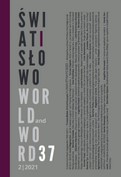Angielskie konstrukcje modalne ‘must HAVE DONE’ i z funkcją ‘pośrednią’ w autentycznym kontekście użycia – studium przypadku
English modal constructions ‘must HAVE DONE’ and intermediate modals in authentic context of use – a case study
Author(s): Dorota ChłopekSubject(s): Language acquisition, Cognitive linguistics, Philology, Distance learning / e-learning, Pedagogy
Published by: Akademia Techniczno-Humanistyczna w Bielsku-Białej
Keywords: linguistic constructions; intermediate modal constructions; the symbolic thesis; the usage-based thesis; concordances; remote form of studying;
Summary/Abstract: The aim of the present paper is to examine the degree to which the first year students of English philology at ATH in Bielsko-Biala are able to recognize the particular modal constructions occurring in authentic linguistic materials, after having been introduced to their forms and meanings theoretically. The paper focuses on contextualization by means of linguistic corpora of selected English modal constructions, such as the perfective use of central modals on the example of ‘must HAVE done’, and particular ‘intermediate’ modals (1. must have; 2. dare + bare infinitive; 3. WE/I shall; 4. BE about to; 5. BE to; 6. HAVE got to; 7. BE bound to; 8. BE willing to; 9. HAPPEN to), following a remote lecture on descriptive grammar of the English language via the MS Teams application during the coronavirus lockdown in January, 2021. The case study concerns the results obtained from an assignment administered to 64 first year students, presented in four tables. The assignment, attached in the form of an MS Word file to edit, required the students to select and cite from either of the two corpora of the English language – BNC or COCA – examples of authentic use of each of the modal constructions studied during one of the lectures.
Journal: Świat i słowo
- Issue Year: 2/2021
- Issue No: 37
- Page Range: 297-317
- Page Count: 21
- Language: Polish

